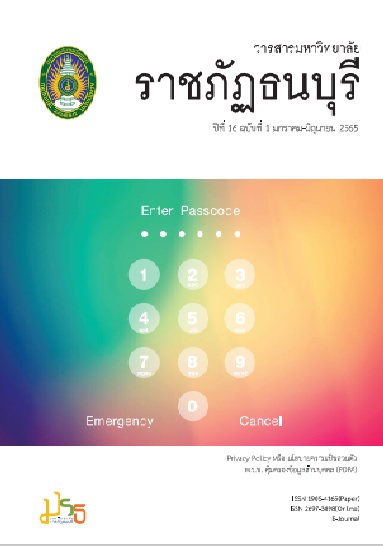Karen Musical Culture: Role in the Development of Community Potentials
Keywords:
Karen music in Ratchaburi province, musical culture, development of community potentialAbstract
Musical culture has been considered to be one of the elements of life that is important for mental development and refinement. It has appeared in different social activities and the way of life in every society through the transmission of sentiment with music and lyrics allowing audiences to understand and feel the emotions deeply. This has been the important foundation for human potential development in aspects of society, economy, and culture. Karen musical culture has an important role in mental development and refinement of people in the Karen community through music in Karen musical performance in various ceremonies telling Karen's way of life, moral, value, attitude, legend, and historical stories of the community. Thus, Karen musical culture has influenced the development of community potential not only in the social dimension but also the economic dimension, such as conceptual and emotional development. It also has an influence on the development of community potential in the cultural dimension appearing in the local cultural preservation, for example, performing Karen music in the Karen's Wrapped Rice Feast in Ratchaburi, allowing Karen music to play a role in energizing and boosting the morale of people in the community, and strengthening the community. Also, it is the significant opportunity for people in the community to learn and participate in the continuation of tradition, which has developed the potential of people in the community on the basis of local cultural wisdom to preserve and promote Karen musical culture leading to sustainable social development in the future.
Downloads
References
กระทรวงการอุดมศึกษา วิทยาศาสตร์ วิจัยและนวัตกรรม. (2564). กลุ่มชาติพันธุ์ในประเทศไทย:งานวิจัยและความท้าทาย. ค้นเมื่อ 2 มิถุนายน 2565, จาก https://www.tsri.or.th/dl/548.
กรรณิการ์ สัจกุล. (2532). ดนตรีศึกษา : จากบ้าน วัดและวัง สู่สถาบันอุดมศึกษา. วารสารครุศาสตร์, 18(1-2), น. 37-40.
ไขแสง ศุขะวัฒนะ. (2541). เครื่องดนตรีของวงดุริยางค์. กรุงเทพมหานคร : โรงพิมพ์ไทยวัฒนาพานิชจำกัด.
จรัญ กาญจนประดิษฐ์. (2547). การศึกษาดนตรีชาวกะเหรี่ยงหมู่บ้านกองม่องทะ ตำบลไล่โว่ อำเภอสังขละบุรี จังหวัดกาญจนบุรี. ปริญญานิพนธ์ศิลปศาสตรมหาบัณฑิต สาขามานุษยดุริยางวิทยา. บัณฑิตวิทยาลัย มหาวิทยาลัยศรีนครินทรวิโรฒ.
ณัชชา พันธุ์เจริญ. (2553). สังคีตลักษณ์และการวิเคราะห์. กรุงเทพมหานคร : ธนาเพรส.
ณรุทธ์ สุทธจิตต์. (2561). ดนตรีศึกษา : หลักการและสาระสำคัญ. กรุงเทพมหานคร : สำนักพิมพ์แห่งฬาลงกรณ์มหาวิทยาลัย.
ประเวศ วะสี. (2547). การพัฒนาต้องเอาวัฒนธรรมเป็นตัวตั้ง. กรุงเทพมหานคร : กองส่งเสริมงานวัฒนธรรม สำนักคณะกรรมการวัฒนธรรมแห่งชาติ กระทรวง
.
พูนพิศ อมาตยกุล. (2553). คลาสสิคสังวาส : รวบรวมความเกี่ยวกับดนตรีคลาสสิคในหลากหลายมุมมอง. นครปฐม : สำนักพิมพ์วิทยาลัยดุริยางคศิลป์ มหาวิทยาลัยมหิดล.
วิรัช ซุยสูงเนิน. (2520). ดนตรีสำหรับครูประถมศึกษา. พิษณุโลก : มหาวิทยาลัยนครินทรวิโรฒ.
สุกรี เจริญสุข. (2532). จะฟังดนตรีอย่างไรให้ไพเราะ. กรุงเทพมหานคร : เรือนแก้วการพิมพ์.
Downloads
Published
How to Cite
Issue
Section
License

This work is licensed under a Creative Commons Attribution-NonCommercial-NoDerivatives 4.0 International License.
บทความที่ได้รับการตีพิมพ์เป็นลิขสิทธิ์ของ มหาวิทยาลัยราชภัฏธนบุรี
ข้อความที่ปรากฏในบทความแต่ละเรื่องในวารสารวิชาการเล่มนี้เป็นความคิดเห็นส่วนตัวของผู้เขียนแต่ละท่านไม่เกี่ยวข้องกับมหาวิทยาลัยราชภัฏธนบุรีและบุคลากรท่านอื่นๆในมหาวิทยาลัยฯ แต่อย่างใด ความรับผิดชอบองค์ประกอบทั้งหมดของบทความแต่ละเรื่องเป็นของผู้เขียนแต่ละท่าน หากมีความผิดพลาดใดๆ ผู้เขียนแต่ละท่านจะรับผิดชอบบทความของตนเองแต่ผู้เดียว







